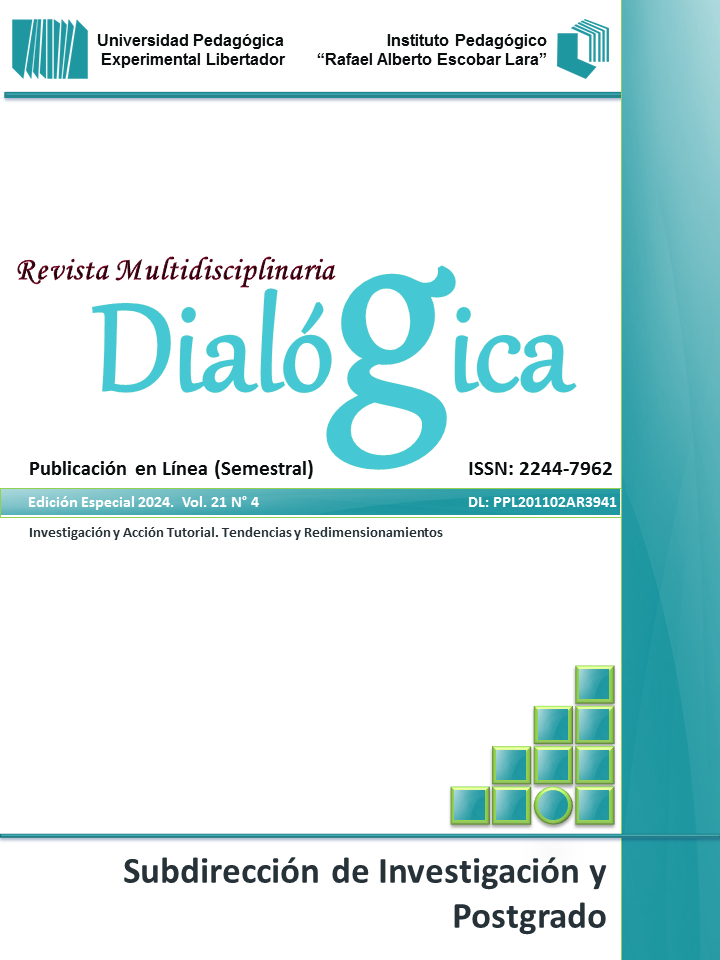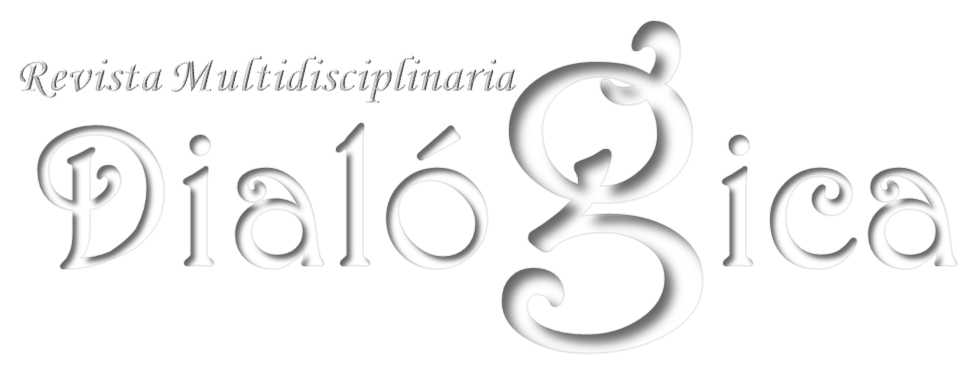SEMIOTIC CONSTITUTION OF METHODOLOGICAL CATEGORIES BASED ON THEORETICAL TERMS IN TUTORIAL TRAINING RESEARCH
DOI:
https://doi.org/10.56219/dialgica.v21i4.3322Keywords:
Semiotic constitution, methodological categories, tutorial researchAbstract
The purpose of this essay was to make an approach to the semiotic constitution of methodological categories in tutorial training research. The choice of semiotics as a science in research is due to the fact that social science studies justify human relationships and understanding of reality from a sociocultural perspective. It focused on the context and postmodernity of postdoctoral studies in Tutorial Training Research, considering, among other authors, the ideas of Hermoso (2021). The approach was made from hermeneutics, with a qualitative approach typical of the interpretive paradigm; which allowed both reflection on the tutorial relationship, production and appropriation of knowledge, as well as constituting epistemological ruptures based on the tutor-thesis student relationship as a new category by delving into the tutorial process. The self-reflection of the tutor and tutees, the theoretical and methodological updating and the conscious assumption of the relevance of the tutor and tutees relationship stand out.
References
Aguaded-Ramírez, E., Pistón-Rodríguez, M., Pegalajar-Moral, M. y Olmedo-Moreno, E. (2020). El sistema de categorías como herramienta para comprender las historias de vida de los menores extranjeros no acompañados. Revista Espacios, 41(41), 173-183. https://www.revistaespacios.com/a20v41n41/a20v41n41p12.pdf
Karczmarczyk, Pedro (2013). La ruptura epistemológica de Bachelard a Balibar y Pêcheux. Estudios de epistemología. Revista digital del instituto de epistemología, (10). https://www.aacademica.org/pedro.karczmarczyk/12
Boaventura de Sousa, S. (2009). Una epistemología del sur .la reinvención del conocimiento y la emancipación social. CASCLO Coediciones editorial siglo XXI.
Gadamer, H. (1998). Verdad y Método. Salamanca.
Gómez Vargas, M., Galeano Higuita, C. y Jaramillo Muñoz, D. A. (julio-diciembre, 2015). El estado del arte: una metodología de investigación. Revista Colombiana de Ciencias Sociales, 6(2), 423-442. DOI: https://doi.org/10.21501/22161201.1469
Hermoso, V. M. (2010). El sujeto en cinco vertientes. SAPIENS, 11(2), 02-08. http://ve.scielo.org/scielo.php?script=sci_arttext&pid=S1317-58152010000200002&lng=es&tlng=es.
Hermoso, V. (2021). Avíos para confinados en UBA-DIEP (Ed.), Veinte lecciones en la formación tutorial, 7, 7–14.
Hernández Sampiere, R., Fernández Collado, C. y Baptista Lucio, P. (2010). Metodología de investigación (6a. ed.). McGraw-Hill.
Leal Gutiérrez, J. (2011). La Autonomía del Sujeto Investigador y la Metodología de Investigación (3a. ed.). http://opac.unellez.edu.ve/doc_num.php?explnum_id=1605
Márquez Pérez, E (2009). Reflexiones sobre cómo construir el proyecto de tesis doctoral desde la perspectiva cualitativa. https://marcoquiroz.wordpress.com/wp-content/uploads/2018/08/reflexiones-sobre-cc3b3mo-construir-el-proyectode-tesis-doctoral-desde-la-perspectiva-cualitativa.pdf
Ortiz, C. (2019). Formación docente y escuelas normales. Editora de Gobierno del Estado de Veracruz.
Pierce, S (S/ F) La ciencia de la semiótica Ediciones Nueva Visión Buenos Aires
Ramírez, C. (2019). Política y gestión de la ciencia, tecnología y la innovación; Una perspectiva desde América latina y del Caribe, el caso de los programas de estímulo de Venezuela. Revista Electrónica Entrevista Académica, 1(3). http//www.eumed.net/rev./reea.hfml.
Real Academia Española. (s.f.). Categoría. En Diccionario de la lengua española. Recuperado en 10 de febrero de 2023, de https://dle.rae.es/categoría.
Russell Barnard, J. M. (2014). De la insularidad a la conectividad: las tendencias en la investigación científica y humanística. Investigación bibliotecológica, 28(63), 7-11. http://www.scielo.org.mx/scielo.php?script=sci_arttext&pid=S0187-358X2014000200001&lng=es&tlng=es.
Downloads
Published
How to Cite
Issue
Section
License
Copyright (c) 2024 Zuleyma Coromoto González Corniel

This work is licensed under a Creative Commons Attribution-NonCommercial-ShareAlike 4.0 International License.


 @revistadialogica
@revistadialogica DialogicaUPEL
DialogicaUPEL RevistaDialogicaUPELMaracay
RevistaDialogicaUPELMaracay dialógicaupel@gmail.com
dialógicaupel@gmail.com dialogicaupel.blogspot.com
dialogicaupel.blogspot.com https://issuu.com/dialogicaupel
https://issuu.com/dialogicaupel https://revistas.upel.edu.ve/index.php/dialogica/
https://revistas.upel.edu.ve/index.php/dialogica/









